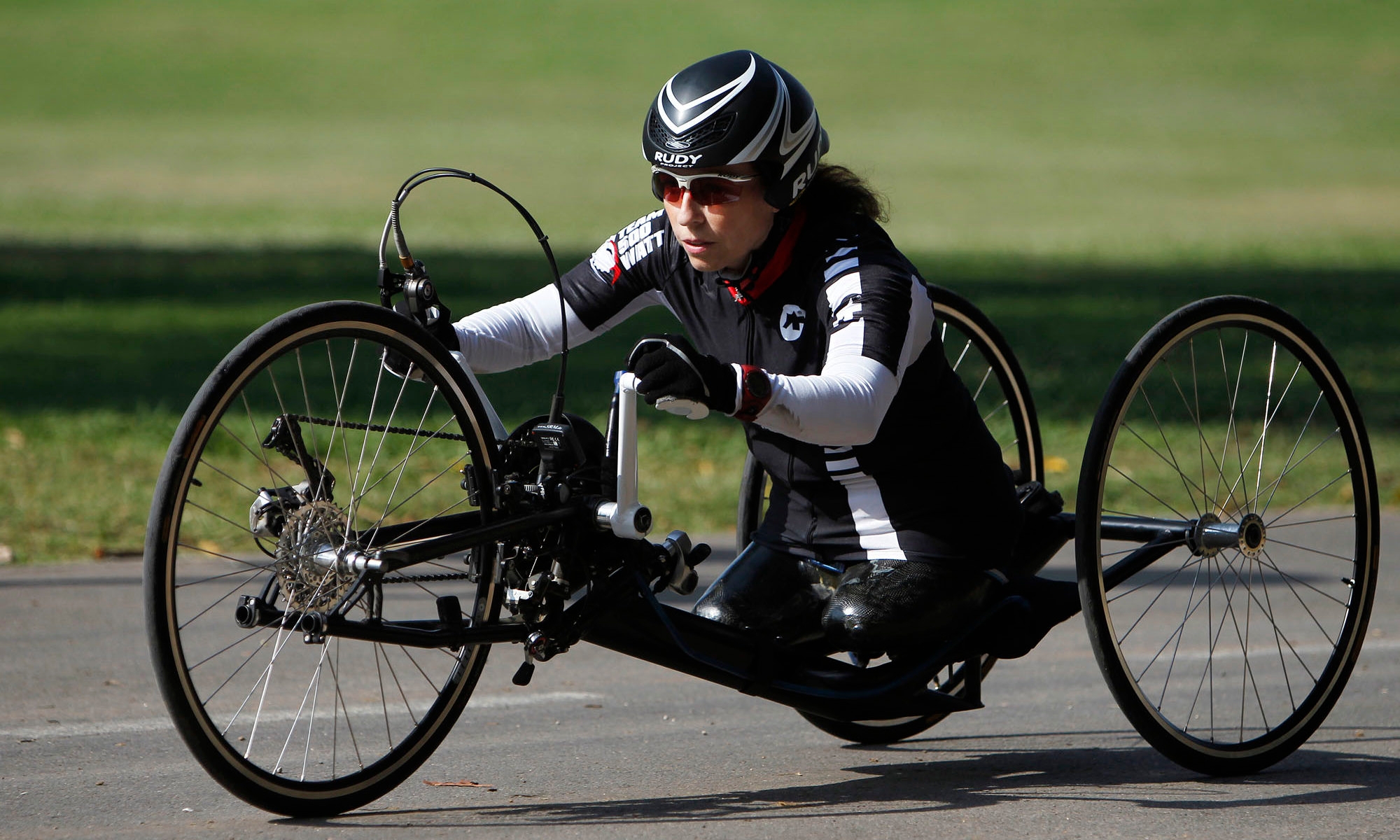
Pascale Bercovitch, an Israeli hand-cyclist who competed in the 2012 London Paralympics, is shooting for a medal in 2016. (Pascale Bercovitch)
TEL AVIV (JTA) – Pascale Bercovitch has a firm handshake and a ready smile. She’s hard to keep up with as she takes an elevator to a cafe on the ground floor of her gym in northern Tel Aviv and talks about her hopes to compete in 2016 in Rio De Janeiro.
It’s easy to forget that she’s 45 years old and has no legs.
“I love to find my limit and push it, to succeed more than I did yesterday,” Bercovitch told JTA. “What interests me is the journey.”
For Bercovitch, who has represented Israel as a rower and handcyclist in the Summer Paralympics, the journey has been long, spanning three decades, three sports and two countries. But she has never stopped competing, even after a gruesome accident left her without her legs at age 17.
Born and raised in a suburb of Paris, Bercovitch started training as a gymnast at age 10. In high school, she began training for competitions and also became a dancer.
Those plans came to an abrupt end one morning in 1985 when Bercovitch, late for school and rushing to catch a departing train, got caught under its wheels. Both of her legs had to be amputated.
“What hurt the most was that I couldn’t dance and I couldn’t do floor gymnastics, couldn’t jump, couldn’t run,” she said. “It was inconceivable. I couldn’t live like that.”
The injury, though, didn’t stop her from fulfilling another dream — moving to Israel, where she felt she could “build a small state” and “do something new and good.” She went on to enlist in the Israel Defense Forces, where she became one of the first volunteers in a wheelchair.
“I understood that there was no other choice than to fulfill your dreams,” she said. “Life can end in an instant. What’s important is to savor every moment. It didn’t matter how.”
Once in Israel, Bercovitch started swimming as part of her rehabilitation and was invited to join the Israeli national team leading up to the 1992 Paralympics in Barcelona. It took her until 2008, though, to make it to the Games.
Without a full-time salary, she had to quit the 1992 team. For nearly the next two decades she worked as a journalist and documentarian, producing “Three-Hundredths of a Second,” an award-winning film on the 2000 Israeli Paralympic delegation to Athens.
Eight years later, in Beijing, she joined the delegation for a different sport — rowing — which allowed her to take advantage of her arm strength. Her passion for athletics, she said, made it possible to overcome the 16-year gap between Games.
“It’s a virus that I have inside me,” said Bercovitch, who placed eighth in 2008. “Sometimes it’s dormant and sometimes it wakes up. When there’s the opportunity, you don’t have to tell me twice.”

Pascale Bercovitch, an Israeli handcyclist who competed in the 2012 London Paralympics, is both an athlete and a motivational speaker. (Inbal Marmari)
Since 2008, Bercovitch has split her time between training, writing and motivational speaking, which she’s done since she was a 19-year-old soldier. On May 8, she spoke at the Ruderman Family Foundation’s Advance Conference in New York, which focused on how the Jewish community approaches disabilities.
“I come from my own small corner,” Bercovitch said. “I don’t come as an expert. I come to shine a light on things people know. I can give people strength.”
Amid competitions and conferences, Bercovitch finds time for two daughters, 3 and 11. Though she wakes up at 5 a.m. daily to work and train for as long as five hours at a stretch, she makes sure to be home by 4 p.m., when her children return from school.
“She’s a very moral person,” said her coach, Oz Dudai, who began training with her last year. “She has a lot of courage and fearlessness. She does things full strength. No one can stop her.”
For the 2012 London Games, Bercovitch tried a new sport, handcycling, and placed fifth. In a recent international competition, she had improved to second and hopes to be on the podium in Rio de Janeiro three years from now.
Dudai said that even qualifying for the team would be difficult for a 45-year-old. “A woman like Pascale can make the Olympics,” he said.
After surviving her accident and returning to competition after a 16-year break, age is no obstacle for Bercovitch.
“I feel that everyone is with me when I represent Israel,” she said. “Whenever I go to the Olympics, I get letters in the mail. People bring me flowers.”
Win or lose, though, Bercovitch says as long as she’s in the game, she’s happy.
“I understood from a young age that I have an athletic spirit,” she said. “You don’t have to do dance or gymnastics. It doesn’t matter what the sport is.”
JTA has documented Jewish history in real-time for over a century. Keep our journalism strong by joining us in supporting independent, award-winning reporting.






